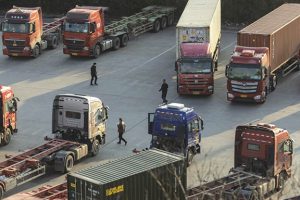Bloomberg
President Joe Biden’s administration will soon start a review of the first group of tariffs on more than $300 billion in Chinese imports needed to prevent their expiration, a process likely to bring new scrutiny of their effectiveness as inflation runs at a four-decade high.
The evaluation, officially known as a “review of necessity,†so far has attracted little attention. It relates to Section 301 of the Trade Act of 1974, the law that President Donald Trump used to hit China with the tariffs starting in July 2018.
The law states that the tariffs expire four years after they were imposed, unless the US Trade Representative’s office analyzes their effectiveness and consequences. The review needs to happen within 60 days of their potential end, which is July 6 for the first group of $34 billion in Chinese goods, with the majority set to expire in the following months.
“This isn’t something that can be ignored,†said Stephen Kho, a partner in the Washington office of law firm Akin Gump Strauss Hauer & Feld LLP, which represents clients who have previously sued to have some of the duties removed. “You can’t just do this process in a half-hearted manner. The review will bring renewed interest in dealing with the Section 301 tariffs.â€
USTR’s press office confirmed the need for the review.
The Biden administration has given no signal of plans to remove the tariffs, even with inflation running above 7% and prices from energy to wheat surging after Russia’s invasion of Ukraine tightened commodity supplies.
Trump slapped the tariffs on China as part of a trade war that saw duties imposed on almost $500 billion in products shipped between the two nations. In early 2020, they agreed to the so-called phase one deal, with the US reducing some tariffs in exchange for Beijing pledging to address intellectual property theft and buy $200 billion in energy, farm and manufacturing goods along with services through last December.
Biden has kept the tariffs in place one year into his presidency as data continually showed China falling far short of US purchase commitments. That has increased the chances that the levies will become a more permanent part of the trade landscape.
USTR Katherine Tai for months has engaged with counterparts in Beijing to get the nation to live up to more of its promises. Negotiations with China have failed to lead to a big breakthrough, and the Biden team sees limited ability to continue pressing ahead on those talks. Without a strong justification for easing the tariffs as US-China tensions simmer, the Biden team has little political room to make such a move even as it hunts for ways to cool inflation ahead of midterm elections in November.
“It’s always harder to unwind trade protection than to put it in place,†said Wendy Cutler, a longtime US trade negotiator who’s now vice president of the Asia Society Policy Institute in Washington. Trump’s phase-one deal provided “no great options for taking action to get China to adhere,†she said.
American companies and lawmakers are asking for tariff relief. Last month, a bipartisan group of 41 senators urged Tai to create a more comprehensive process to exclude some Chinese imports from the tariffs, which they say have a negative impact on U.S. businesses.
Tai’s office from last October to December sought public comment on whether to reinstate tariff exclusions on 549 products from China.
Five months after opening the comment period, it’s yet to take public action, with USTR’s annual report this month saying that it’s continuing to review the submissions.
 The Gulf Time Newspaper One of the finest business newspapers in the UAE brought to you by our professional writers and editors.
The Gulf Time Newspaper One of the finest business newspapers in the UAE brought to you by our professional writers and editors.
